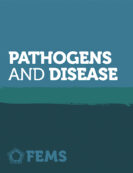FEMS Journals Oral Presentation Prize: Zandra Fagernäs
FEMS Online Conference on Microbiology 2020
We send our congratulations to Zandra Fagernäs (@ZandraSelina), who won the Oral Presentation Prize for Early Career Scientists at the FEMS Online Conference on Microbiology 2020, sponsored by the FEMS journals.
 The FEMS Online Conference on Microbiology took place between the 28th and 31st of October 2020 as a virtual conference. In her winning presentation Zandra talked about the “Biogeography of the ancient oral cavity“.
The FEMS Online Conference on Microbiology took place between the 28th and 31st of October 2020 as a virtual conference. In her winning presentation Zandra talked about the “Biogeography of the ancient oral cavity“.
Read our interview with Zandra about her research below:
What is your current position and what was your scientific journey to get there?
I am currently a Ph. D. student in the Microbiome group in the Department of Archaeogenetics at the Max Planck Institute for the Science of Human History (Germany). The topic of my Ph. D. is method development for archaeological dental calculus research. Before this, I got my bachelor’s and master’s degrees at Umeå University (Sweden). My master’s degree was in population genetics of Norway spruce, so the step to working with ancient microbes for my Ph.D. was quite big!”
Could you describe the research your poster covered?
The work I presented at the conference was on intra-individual variation in the archaeological dental calculus microbiome. We have shotgun sequenced DNA from dental calculus from four Chalcolithic Iberian individuals, and are studying how the microbial community composition varies across different locations in the oral cavity. Our aim is to identify patterns, which may bias the results depending on the sampling location – for example, sampling from anterior or posterior teeth, or from the buccal or lingual side of a tooth. We hope that our results can help design sampling strategies for future dental calculus projects, as well as help researchers interpret their results. Since we are working with archaeological materials, it is often not possible to choose the sampling locations – due to e.g. tooth loss, low occurrence of calculus, or sampling restrictions – but if biases caused by sampling location are known, we can avoid drawing false conclusions!”
What do you hope to focus your research on in the future?
In the future, I hope to stay in the field of archaeological sciences, and develop improved methods for studying archaeological materials. Seeing as these materials are finite, we need to make sure that we are analysing them responsibly, using the best available methods to study them, and getting as much information from each sample as is possible.”
–
We use income from the FEMS Journals to fund grants, awards, and projects, and to support our knowledge sharing events and initiatives. Consider publishing your research with our journals to help the global microbiology community.
All but one of the FEMS journals are now fully open access (OA), with one journal, FEMS Microbiology Letters remaining a subscription journal with free-to-publish and OA options. Open access is key to supporting the FEMS mission of disseminating high quality research as widely as possible: when high quality, peer reviewed sound science is open access, anyone, anywhere in the world with an internet connection, can read it.







